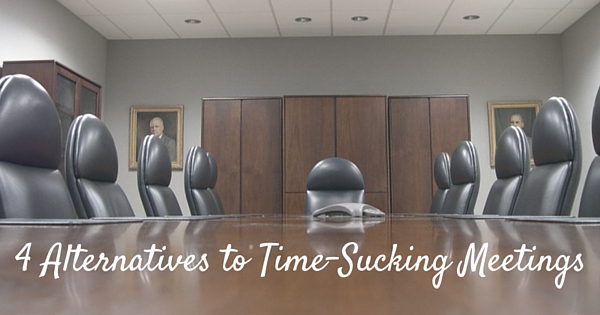Get more good stuff.

Next time you’re in a meeting pretending to listen while checking your email and wondering “why am I here?”, pull up your calendar instead and start clearing your schedule.
Here’s why…
Meetings take time, are expensive, and most meetings are unproductive:
- People spend an average 4 hours each week preparing for status update meetings
- Managers spend upwards 35% of time in meetings (50% for upper-management)
- 67% of meetings are considered failures
- 92% of people multitask during meetings
(stats courtesy of The Muse)
 In a Harvard Business Review article, Making Time for the Work That Matters, executives who prioritized their most important tasks and dropped the rest found their desk-work was cut by an average of 6 hours per week and meeting time was cut by an average of 2 hours per week. One executive was able to better use her time supporting her team; increasing sales by 5% over a three-week period.
In a Harvard Business Review article, Making Time for the Work That Matters, executives who prioritized their most important tasks and dropped the rest found their desk-work was cut by an average of 6 hours per week and meeting time was cut by an average of 2 hours per week. One executive was able to better use her time supporting her team; increasing sales by 5% over a three-week period.
By making a conscious decision about how we spend our time, we can cut out waste and focus on high-value (and more rewarding) tasks. This includes personal time too , so think of volunteer committees and activities you’re involved with in addition to work meetings.
4 Meeting Alternatives
Collaborating with others is an essential part of getting things done, but can often be done more efficiently without a traditional meeting.
Try these alternatives instead:
- e-Publishing
- With all of the online tools available, everyone can publish updates or share information. Use a blog or wiki for ongoing updates about a project or department. Email regular status reports to key stakeholders. Instant message with individuals and groups for quick and informal discussions.
- One-on-Ones
- We’ve all been in meetings where 15 people take turns giving status updates. While there is some overlap, there is also a lot of information that doesn’t pertain to everyone and is therefore a waste of time. One-on-one face-to-face or online video chats can be efficient alternatives to group meetings. Leaders and managers can gather information from individuals and share what’s important with the group.
- Collaborative Apps
- 15-Minute Stand-up
- Take a note from Agile project management by holding daily stand-up meetings with your team. These morning meetings are usually 5 – 15 minutes, don’t involve computers, and everyone is literally standing. Ask and answer these 3 questions:
- What did I accomplish yesterday?
- What will I do today?
- What obstacles are impeding my progress / where do I need help? –> most important
- Take a note from Agile project management by holding daily stand-up meetings with your team. These morning meetings are usually 5 – 15 minutes, don’t involve computers, and everyone is literally standing. Ask and answer these 3 questions:
What alternatives to meetings have you used? Share your thoughts below!

Jackie, you’re definitely right! People spend too much time on this useless meetings and they are horrible time wasters! We’re using Pyrus for task management and conduct most of approvals there. Previously used Asana – just switched to a more sophisticated solution for our needs. Saves our team’s time dramatically!
Thanks for your comment, Julie, and I’m glad you enjoyed the post! Yes, imagine what we could do if we cut out all the unnecessary stuff.
It sounds like Pyrus is doing its job by making your work easier – that’s great!